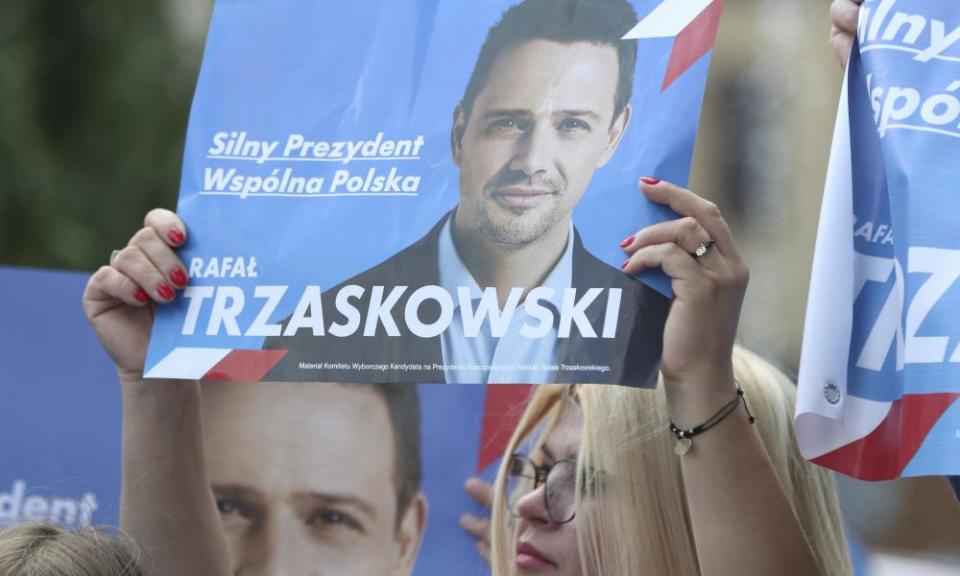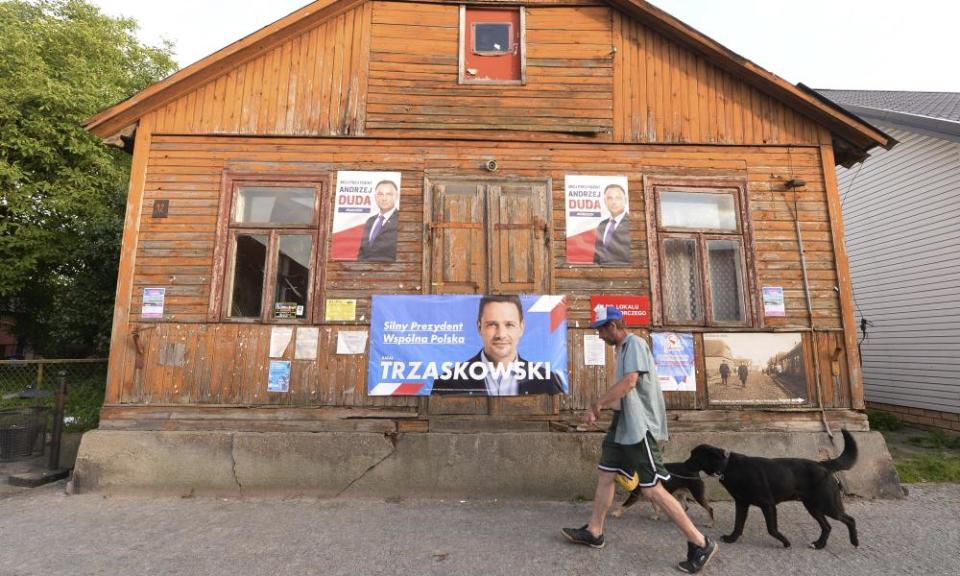Future of 'Third Republic' defines run-off vote in Poland

It was an event – or rather two events – that marked the symbolic nadir of 30 years of rancorous political division in Poland since the fall of communism in 1989.
On Monday evening, Poland’s conservative president, Andrzej Duda, and his challenger in Sunday’s presidential election run-off, the liberal mayor of Warsaw, Rafał Trzaskowski, each held their own separate “presidential debate” in different parts of the country, each boycotting the other’s event and each fielding questions alone next to an unmanned podium bearing the name of their rival.
Polish voters go to the polls on Sunday for the second time in two weeks, with Duda having secured 43.5% of the vote in the first round. Trzaskowski received 30.5% but is expected to receive the majority of votes cast by supporters of candidates eliminated after the first round. Pollsters say the race is too close to call.
The campaign has been draining for candidates and voters alike, held in the shadow of the coronavirus crisis and with voting already having been postponed from May, amid bitter recriminations concerning the apparent determination of Poland’s ruling Law and Justice party (PiS) for the vote to be held before the economic consequences of the country’s largely successful lockdown are felt.
Despite the trying circumstances, there is widespread consensus that Poles face a momentous decision on the country’s future, with the election serving as a referendum on the “Third Republic”, the liberal democratic constitutional order established after communism’s demise.
“Duda has been a central and active player in PiS’s attempts to dismantle liberal democracy in Poland,” said Anna Wójcik, a legal researcher at the Polish Academy of Sciences who runs an NGO monitoring government violations of the rule of law. “Poles are going to have to decide whether they want a pluralistic democracy, or a majoritarian democracy with no effective constraints on the ruling party.”

It is a political choice neatly personified by the two candidates. Both aged 48, they were born just four months apart. Both went to prestigious high schools in major cities, and each has a doctorate from one of Poland’s two leading universities. Both have also represented the same parliamentary constituency of Duda’s hometown, the historic southern city of Kraków.
Their backgrounds, however, are markedly different – illustrating the fissures of class, culture and geography that perpetuate the country’s political polarisation, and lending an element of psychodrama to Sunday’s proceedings.
“Simply put, Duda and Trzaskowski are the faces of the two Polands,” said Adam Szostkiewicz, a veteran political commentator for Polityka, a political weekly.
Trzaskowski, the son of a famous jazz musician, grew up in Warsaw and spent a year at an American high school in Michigan in the early 1990s. A specialist in international relations with a degree in English philology, he studied at the College of Europe in Warsaw and was awarded scholarships by Oxford University and the European Union Institute for Security Studies in Paris before entering politics.
Duda, who studied and later taught law at Jagiellonian University in Kraków, is the son of lecturers at Kraków’s former mining university and received a much more traditional – and by some accounts, severe – upbringing steeped in Catholicism and conservative values. As a youth, he was a member of the Polish scouting movement, a pillar of the country’s patriotic tradition.
“Trzaskowski is identified with a cosmopolitan Polish tradition that is liberal, internationalist and pro-European, whereas Duda represents a Poland that is provincial, conservative and Polonocentric,” said Szostkiewicz. “This is what separates us, it is what has always separated us, and we are all guilty of it.”

Supporters of both candidates have attempted to use the different backgrounds of their rivals against the other. Trzaskowski’s supporters have made much of the fact that their candidate speaks five European languages, in contrast to the near-monolingual Duda, who was ridiculed on social media earlier this year after failing to express himself confidently in English during a panel discussion at the World Economic Forum in Davos.
In turn, PiS and its supporters have sought to portray Trzaskowski as an agent of malign foreign influence. PiS-controlled state television news has described the opposition candidate as working on behalf of a “powerful foreign lobby” connected to the Bilderberg group and the Jewish-American financier George Soros; pointedly, Duda’s campaign slogan describes him as a “president for Polish interests”.
“For the cosmopolitan tradition in Polish culture, the social hierarchy is built on contempt for those considered to be less cultured, a deeply rooted attitude that originates in the contempt felt by the gentry for the peasantry,” said Maciej Gdula, a sociologist at the University of Warsaw who specialises in the study of the Polish class system and is a leftwing MP for the same Kraków constituency once represented by Duda and Trzaskowski.
“For the rightwing tradition, on the other hand, the social hierarchy is based on ethnicity, manifesting itself as hostility towards minorities, whether it be Jews, Muslim migrants, or in the case of the present campaign, members of the LGBT community. We have seen a clash of these two attitudes during the campaign.”
At the centre of the cultural divide is the contentious role played by the Catholic church in Poland’s public life. Duda has made ostentatious displays of faith a feature of his presidency, and enjoys the support of Poland’s powerful church hierarchy. He drew international condemnation last month for his remarks on the campaign trail describing advocates of LGBT rights as promoting an “ideology” that was “even more destructive to man” than Soviet-imposed communism.
Mindful of the need not to alienate the complex coalition of second-preference voters he needs to secure victory, which includes leftwingers, moderate conservatives and even some far-right libertarians, Trzaskowski has sought to avoid being dragged into a confrontation on religious and social issues.
But observers say the liberal candidate’s reluctance to engage with the culture war, while understandable, illustrates a crucial potential weakness.
“For his supporters, Duda is seen as the ideal candidate, whereas Trzaskowski’s voters are more likely to see him as a reasonable compromise, the lesser of two evils,” said Szostkiewicz. “I suspect that in the final analysis this could be his undoing.”


